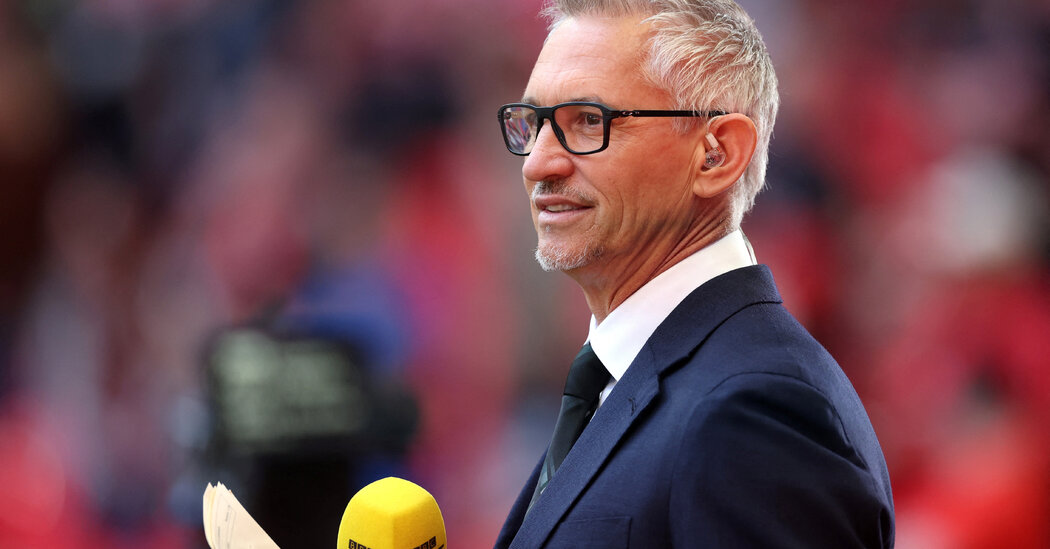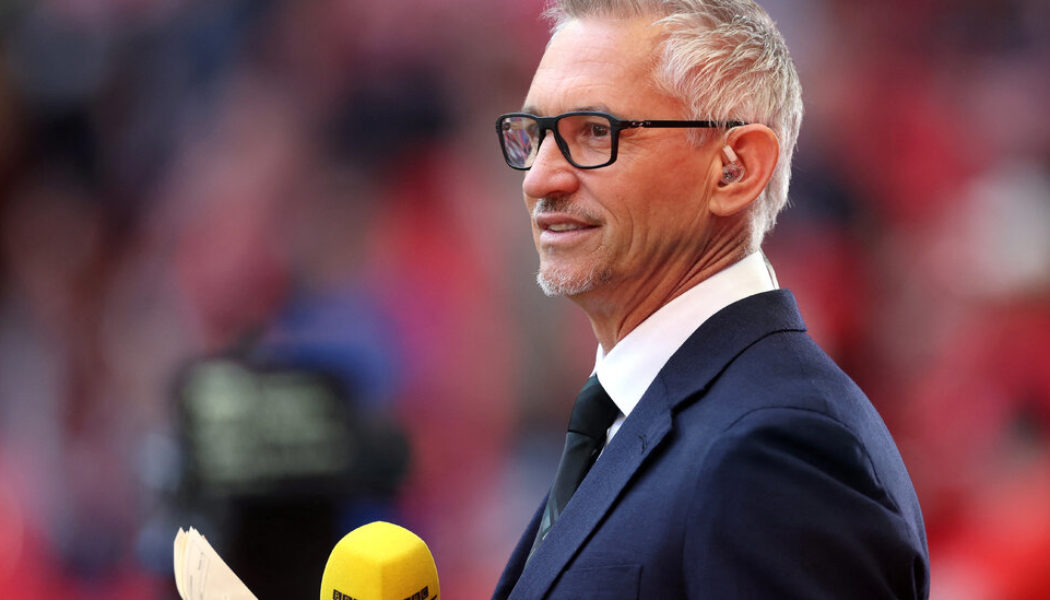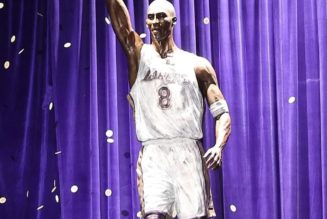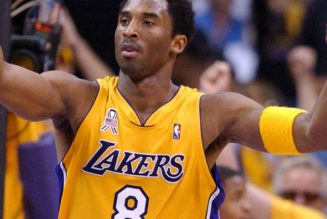
One of England’s best-known sports personalities, he was taken off the air after criticizing a British government immigration proposal on social media. His ouster set off a staff boycott.
LONDON — The BBC scrambled to rearrange hours of programming in real time on Saturday after the suspension of the popular host of its cornerstone soccer program set off a revolt by on-air talent, forcing the broadcaster to curtail major portions of its weekend sports coverage and leaving it to face accusations that Britain’s culture wars had bled into its decision-making.
The crisis began on Friday with the announcement that the BBC had suspended Gary Lineker, the former English soccer star and longtime host of the soccer program “Match of the Day,” over comments that he made criticizing the Conservative government’s immigration plans.
By Saturday, the decision to remove Mr. Lineker from “Match of the Day” — a fixture on British television since the 1960s that is watched by millions every weekend — had led not only his co-hosts but also their potential replacements, related play-by-play commentators, and even players and coaches from the Premier League to join a spreading boycott.
Even the prime minister, Rishi Sunak, felt compelled to comment by day’s end, praising Mr. Lineker and defending his government’s immigration plan.
“I hope that the current situation between Gary Lineker and the BBC can be resolved in a timely manner, but it is rightly a matter for them, not the government,” he said.
Controversy had been brewing for days, ever since Mr. Lineker, a former captain of England’s national soccer team and the top goal scorer at the 1986 World Cup, suggested on Tuesday that the British home secretary, Suella Braverman, was using language reminiscent of 1930s Germany to promote a plan to stop asylum seekers who arrive on boats across the English Channel.
After several days of debate on social media, in the pages of British newspapers and in the halls of Parliament, the BBC said on Friday that Mr. Lineker’s social media activity was “a breach of our guidelines” and that he had been suspended from hosting “Match of the Day.”
“The BBC has decided that he will step back from presenting ‘Match of the Day’ until we’ve got an agreed and clear position on his use of social media,” the BBC said in a statement.
“We have never said that Gary should be an opinion-free zone,” it added, “or that he can’t have a view on issues that matter to him, but we have said that he should keep well away from taking sides on party political issues or political controversies.”
Protests in support for Mr. Lineker began soon afterward, and spread to other BBC sports programming as a stream of hosts and commentators on other programs announced that they, too, would refuse to work.
That left the BBC hurrying to rearrange its schedule: “Football Focus,” a magazine-style program that usually airs before the day’s games kick off, was replaced by an antiques-hunting show. “Final Score,” in which a panel of commentators discusses sports results live on the air, vanished from the lineup as well, its late-afternoon slot suddenly filled by a gardening show.
On BBC radio, one program that offers live soccer coverage was replaced by a taped podcast after members of its staff joined the boycott.
BBC executives, meanwhile, issued repeated apologies: to viewers for offering only “limited sport programming,” and to staff, through an email that was quickly leaked to multiple journalists.
The confusion and anger left the BBC in the middle of another roiling conversation about political bias and whether its leadership was holding Mr. Lineker, whose statements were critical of Britain’s Conservative government, to a standard different from other high-profile BBC employees who were more supportive of it.
In an interview on the BBC on Saturday night, the broadcaster’s director general, Tim Davie, said he was open to reassessing the guidelines on social media that had led to Mr. Lineker’s suspension and expressed an eagerness to find a resolution. “Success, for me, is Gary gets back on air,” he said.
By late Saturday, however, the controversy showed no signs of ending. BBC sports programming in Wales and Scotland was curtailed. Another former player-turned-commentator, Jermain Defoe, said he would sit out the Sunday edition of “Match of the Day.” And in Leicester, where Mr. Lineker turned up to watch one of his former teams play, fans held up signs reading, “I’m With Gary. Migrants welcome.”
Mr. Lineker has made no public comments on his suspension. Greeted by reporters as he left his London home on Saturday, he declined to answer their questions about his suspension or his future with the BBC.
“Match of the Day” went on without him. Trimmed to 20 minutes instead of its usual hour or more, the program opened abruptly without its bouncy theme song and then cut wordlessly to highlights of six games that featured only crowd noise and occasional captions to denote their goal-scorers and final scores.
Missing were the commentary from former stars and interviews with players and coaches that are its staples, and which have elevated the program from a mere highlights show to a collective Saturday night experience and a British cultural touchstone.
The program is so integral to the way English fans catch up on soccer results, in fact, that the national news broadcasts that precede it routinely warn viewers to look away from their screens before the day’s scores are shown — lest they spoil the drama to follow.
This week, viewers knew, would be unusual. Soon after the BBC announced Friday that Mr. Lineker would be off the air, the two other former star players who host the show alongside him, Ian Wright and Alan Shearer, said they had told the BBC they would not appear on the show on Saturday.
Within hours, a group of commentators scheduled to call individual matches said that they, too, would refuse to take part. They were soon joined in the walkout by the on-air talents from a variety of BBC sports programs, and the scramble to fill the empty airtime was on.
Mr. Lineker, who first appeared on “Match of the Day” as a presenter in 1999, signed a five-year contract in 2020 to remain with the BBC until 2025.
After parlaying his hugely successful soccer career into work as one of Britain’s best-known sports personalities, he has frequently engaged in debates on social media, most prominently when he supported the campaign for Britain to remain in the European Union.
His comments have sometimes led to criticism from the right and accusations that he is violating BBC guidelines on impartiality.
Such was the case with his comments on Tuesday on the government’s plan to stop asylum seekers. Mr. Lineker had responded on Twitter to a video posted by the Home Office, which oversees immigration enforcement, in which Ms. Braverman promoted legislation that would give the department a “duty” to remove nearly all asylum seekers who arrive on boats across the English Channel, even though many are fleeing war and persecution.
“Enough is enough,” Ms. Braverman declares. “We must stop the boats.”
Mr. Lineker responded with sharp criticism.
“This is just an immeasurably cruel policy directed at the most vulnerable people in language that is not dissimilar to that used by Germany in the 30s, and I’m out of order?” he wrote.
The comments were roundly rejected by Ms. Braverman and others on the right, and set off a debate about the BBC’s impartiality and the comparison to 1930s Germany, which Ms. Braverman derided as “a lazy and unhelpful comparison to make.”
In The Daily Telegraph, the journalist Charles Moore accused Mr. Lineker of being “the most famous exemplar of the power of the BBC’s ‘talent’ to trash its impartiality.”
“He is the big player who thinks he can defy the ref,” Mr. Moore wrote. “The reputation of the entire BBC and its director-general depends on telling him he cannot.”
On the political left, others defended Mr. Lineker.
“This feels like an overreaction brought on by a right-wing media frenzy obsessed with undermining the BBC,” Lucy Powell, a member of Parliament who serves as the opposition’s spokeswoman for digital, culture, media and sports matters, wrote on Twitter.
Stephen Castle contributed reporting.
Services Marketplace – Listings, Bookings & Reviews









